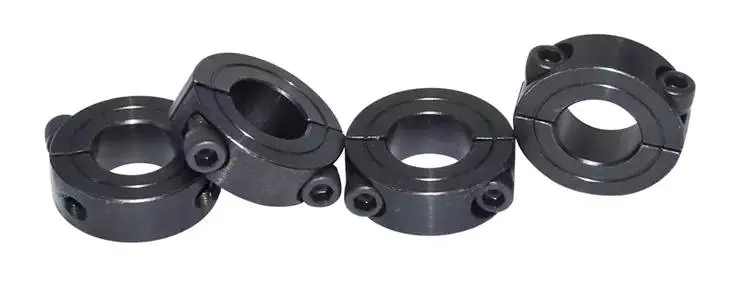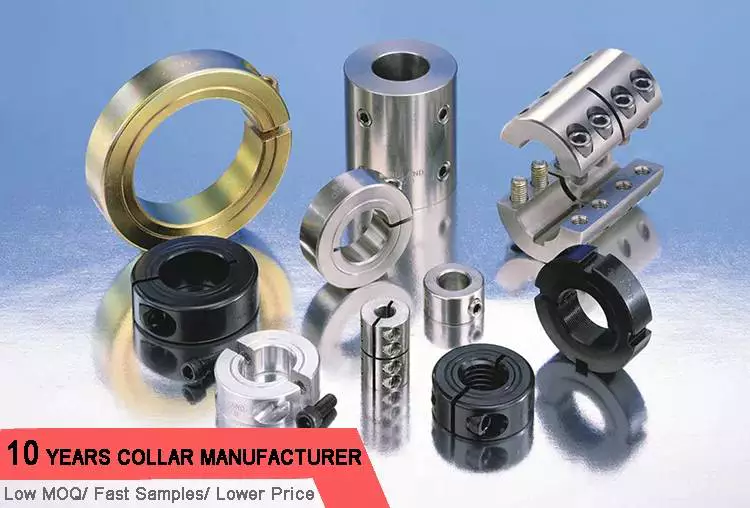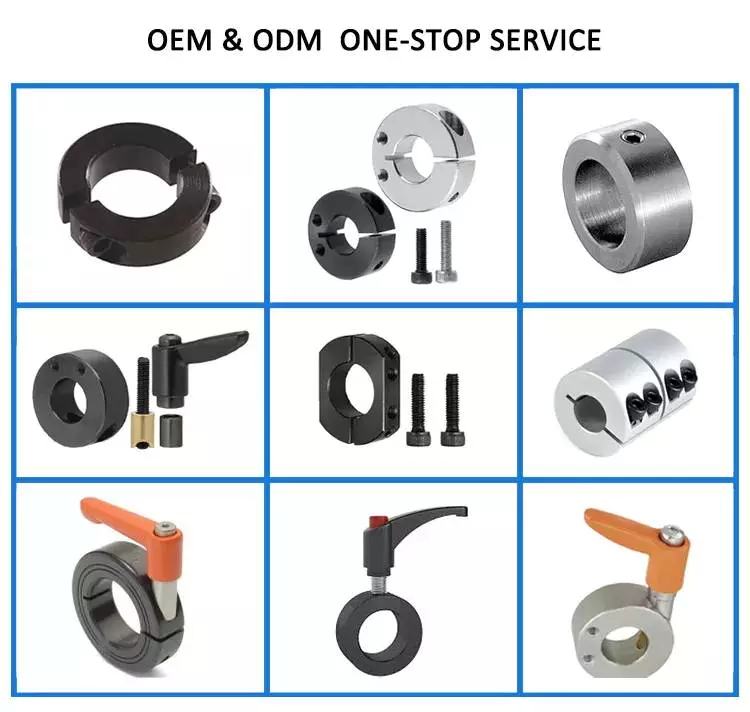What are the temperature and corrosion resistance properties of shaft collars?
The temperature and corrosion resistance properties of shaft collars vary depending on the materials they are made of. Different materials exhibit different levels of resistance to temperature extremes and corrosion. Here are some commonly used materials for shaft collars and their temperature and corrosion resistance properties:
- Steel: Steel shaft collars, particularly those made from stainless steel, offer excellent temperature and corrosion resistance properties. Stainless steel is known for its high strength, durability, and resistance to rust and corrosion. It can withstand a wide range of temperatures, from low cryogenic temperatures to high heat environments. Stainless steel shaft collars are often used in applications where exposure to moisture, chemicals, or harsh environments is a concern.
- Aluminum: Aluminum shaft collars have good temperature resistance properties and can handle moderate temperature ranges. They are lightweight and offer reasonable corrosion resistance. However, aluminum is not as corrosion-resistant as stainless steel and may be susceptible to certain chemicals or highly corrosive environments. Aluminum shaft collars are commonly used in applications where weight reduction is a priority, such as aerospace or automotive industries.
- Plastic: Plastic shaft collars, such as those made from nylon or acetal, have limited temperature resistance compared to steel or aluminum. They can typically handle moderate temperatures but may deform or degrade at higher temperatures. Plastic collars are not as resistant to corrosion as metal collars but can still offer good resistance to certain chemicals and environmental conditions. Plastic collars are often used in applications where weight, cost, or electrical insulation properties are important factors.
- Brass: Brass shaft collars offer good temperature resistance and moderate corrosion resistance. They can handle a range of temperatures and are often used in applications where a combination of durability, conductivity, and aesthetics is required. Brass collars may tarnish over time but can still maintain their functionality and structural integrity.
It is important to note that the temperature and corrosion resistance properties of shaft collars can also be influenced by factors such as the specific alloy composition, surface treatments, and environmental conditions they are exposed to. When selecting shaft collars for your application, it is crucial to consider the temperature range and potential exposure to corrosive substances or environments. Consulting with manufacturers, reviewing technical specifications, and considering industry standards or guidelines can help ensure that you choose shaft collars with appropriate temperature and corrosion resistance properties for your specific needs.
Where can I purchase shaft collars with set screw or clamp-style designs?
If you are looking to purchase shaft collars with set screw or clamp-style designs, there are several options available to you. These types of shaft collars can be found in various industrial supply stores, online marketplaces, and directly from manufacturers. Here are some places where you can purchase shaft collars with set screw or clamp-style designs:
- Industrial Supply Stores: Local industrial supply stores or distributors that specialize in mechanical components and equipment often carry a range of shaft collars. These stores may have a physical location where you can visit and browse their inventory. They typically have knowledgeable staff who can assist you in selecting the right collar design and size for your specific application.
- Online Marketplaces: Online marketplaces, such as Amazon, eBay, or Alibaba, offer a wide selection of shaft collars with set screw or clamp-style designs. These platforms allow you to search for specific collar types, sizes, and materials, and compare prices and customer reviews. When purchasing from online marketplaces, it is important to verify the credibility and reputation of the sellers to ensure product quality and reliability.
- Manufacturer Websites: Many manufacturers of shaft collars have their own websites where you can directly purchase their products. Visiting the websites of reputable collar manufacturers allows you to explore their product catalogs, specifications, and available collar designs. This can be particularly useful if you are looking for specific features, customization options, or require technical assistance from the manufacturer.
- Online Industrial Suppliers: Online industrial suppliers or distributors specialize in providing a wide range of mechanical components and equipment. These suppliers often have extensive catalogs of shaft collars with various designs, including set screw and clamp-style options. They typically offer convenient online ordering and delivery options, making it easy to browse and purchase the collars you need.
- Trade Shows and Exhibitions: Attending trade shows or exhibitions related to industrial components and equipment can provide an opportunity to connect with multiple suppliers and manufacturers in one place. These events often feature exhibits where you can interact directly with vendors, explore their product offerings, and discuss your specific requirements. Trade shows can be a valuable resource for finding and purchasing shaft collars with set screw or clamp-style designs.
When purchasing shaft collars, it is important to consider factors such as collar material, size range, load capacity, and any specific requirements of your application. Comparing prices, reading customer reviews, and ensuring the reliability of the seller or manufacturer can help you make an informed decision and obtain high-quality shaft collars that meet your needs.
What are the different types of shaft collars available in the market?
In the market, there are various types of shaft collars available, each designed to meet specific application requirements. Here are some commonly used types of shaft collars:
- Set Screw Shaft Collars: Set screw shaft collars are the most common type and feature one or more set screws that tighten against the shaft to secure the collar in place. These collars have a simple design and are available in various materials such as steel, stainless steel, or aluminum. Set screw collars are easy to install and provide a reliable grip on the shaft.
- Clamping Shaft Collars: Clamping shaft collars use a clamping mechanism, such as a split design with two halves and bolts, to tighten around the shaft. They provide a strong and secure grip and are often used in applications where frequent adjustments or repositioning of the collar is required. Clamping collars are available in different materials and can provide excellent holding power.
- One-Piece Solid Shaft Collars: One-piece solid shaft collars are made from a single piece of material, typically metal, and have no moving parts. They are simple in design and provide a lightweight and compact solution for applications where space is limited. These collars are often used in light-duty applications or as a stop or spacer on a shaft.
- Two-Piece Split Shaft Collars: Two-piece split shaft collars consist of two halves that can be assembled and tightened around the shaft using screws or bolts. This design allows for easy installation and removal without the need to slide the collar along the shaft. Two-piece split collars are commonly used in applications where the shaft cannot be easily disassembled or where frequent adjustments are required.
- Threaded Shaft Collars: Threaded shaft collars have internal threads that allow them to be screwed onto a shaft. They provide a secure and adjustable grip when tightened against the shaft. Threaded collars are often used in applications where precise positioning or fine adjustment is needed.
- Hinged Shaft Collars: Hinged shaft collars feature a hinge mechanism that allows for easy installation and removal without completely disassembling the collar. They are often used in applications where frequent access to the shaft is required or when the collar needs to be quickly repositioned or replaced.
- Flanged Shaft Collars: Flanged shaft collars have an extended flange on one side, which provides additional support and acts as a stopping point for other components. The flange helps prevent axial movement of the collar and provides a reference surface for locating or positioning other elements, such as bearings, gears, or pulleys.
- Specialty Shaft Collars: In addition to the standard types mentioned above, there are specialized shaft collars designed for specific applications. These include torque-limiting collars, indexing collars, quick-release collars, and shaft collars with integrated components such as gears or pulleys. These specialty collars cater to specific needs and offer unique features to enhance functionality or simplify assembly.
The choice of shaft collar type depends on factors such as the application requirements, shaft size, load capacity, ease of installation, and adjustability. It’s important to select the appropriate type of shaft collar that best suits your specific application to ensure proper functionality and secure shaft positioning within the mechanical system.
editor by Dream 2024-05-08




